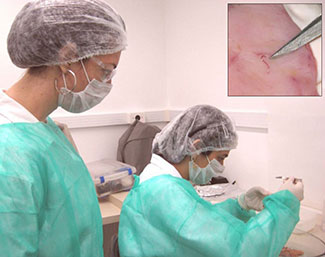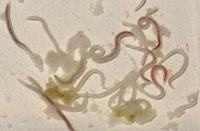Fogarty support launches career in infectious diseases for Dr Jeffrey Bethony
July / August 2017 | Volume 16, Issue 4

Photo courtesy the Bethony lab
With his Fogarty grant for early-career scientists, Dr. Jeffrey
Bethony established research projects in Brazil and began
scientific partnerships that continue today.
Diseases of poverty - such as hookworm and schistosomiasis - get little attention but affect as many as 900 million people living in developing countries. These afflictions are most prevalent where there is inadequate sanitation and safe drinking water. The chronic illnesses caused by these parasites weaken their victims, making it impossible for them to work enough to improve their living conditions.
Former Fogarty grantee Dr. Jeffrey Bethony has devoted his career to seeking solutions to break this cycle of sickness and grinding poverty. Early on, he got a boost from a Fogarty career development award that enabled him to study parasitic diseases in Brazil. Twenty years later, he still collaborates with his mentors from that project and continues to contribute to the research enterprise he helped develop in Brazil.
His Fogarty-supported foreign experience helped him build interdisciplinary research skills and develop a scientific track record. He and his mentors have gone on to attract additional funding for their work - from NIH, the Dutch government and a $22 million grant from the Bill & Melinda Gates Foundation to develop a hookworm vaccine. The research sites he helped establish in Brazil are now being used for NIH-funded clinical trials for a variety of vaccines, including for hookworms, schistosomiasis and, most recently, Zika virus.
"I owe my whole career to the IRSDA," says Bethony who was supported by a Fogarty International Research Scientist Development Award (IRSDA) from 2000-2006. When he was starting out, he explains, there were more opportunities in HIV and influenza research than for the diseases he was studying. "The Fogarty grant enabled me to set up a research site, which has served me my entire career. The IRSDA really made me who I am," Bethony says. "For me, it was a real lifesaver and life-changer."
Bethony is now a tenured professor of microbiology, immunology and tropical medicine and vice-chair of translational research at the George Washington University (GW) School of Medicine and Health Sciences in Washington, D.C. He has a lab on the GW campus, as well as a lab and clinic in Brazil that he developed in partnership with the Oswaldo Cruz Foundation (FIOCRUZ), a scientific research institution that falls under the country's health ministry.

Photo courtesy the Bethony lab
Hookworm and schistosomiasis
affect as many as 900 million people
living in developing countries.
Much of Bethony's work focuses on human hookworm infection and schistosomiasis, both caused by parasitic worms. "These are diseases of poverty that keep people in poverty," he says. "There's an especially heavy impact when they infect an economic earner in the house, such as a mother or father who then can't provide for their kids."
Bethony's IRSDA research looked for an association between human genetics and parasitic infections to determine if certain individuals are more susceptible to the diseases. Working in Minas Gerais state in Brazil, Bethony gained experience that included basic fieldwork, enumerating populations and obtaining consent for clinical trials; laboratory research; and statistical analysis related to quantitative genetics.
"My IRSDA equipped me with this interdisciplinary approach to these diseases," Bethony notes. "I learned how to do immunology in those endemic settings, which really at the end of the day, was geared more toward vaccines, and specifically vaccines for parasitic infections." And, that's the direction his career took.
Vaccine research - pre-clinical testing and clinical trials - has become a large part of Bethony's portfolio. He collaborates with GW colleagues, and his mentors, Dr. Rodrigo Correa-Oliveira of FIOCRUZ and Dr. Peter Hotez, formerly of GW and now with Baylor College of Medicine.
The Brazilian lab and clinic that were built up around his research now have a staff of more than 30 people, including scientists, clinicians, nurses and lab technicians. It's these relationships, fostered with Fogarty support, that are so critical to improving global health and security, Bethony says. "I don't know where the next Ebola outbreak will be or where Zika will strike next. You can't just send anybody out there. You have to send someone who knows the lay of the land and how to organize," he observes. "Fostering these personal relationships is what Fogarty does and is the key to global health."
More Information
To view Adobe PDF files,
download current, free accessible plug-ins from Adobe's website.